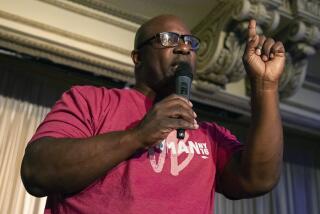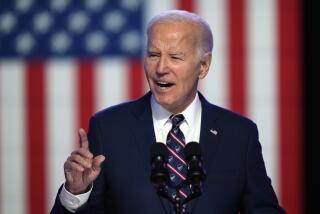Buchanan the Wild Card in Reform Party Tussle
- Share via
WASHINGTON — Strategists in both parties are bracing for a political earthquake if conservative firebrand Patrick J. Buchanan seeks and wins the Reform Party’s presidential nomination for 2000. But that may be a bigger “if” than is now assumed.
The question isn’t so much whether Buchanan will seek the nomination--he intimated Saturday that it’s all but certain he will quit the GOP presidential race and chase the Reform Party nod, possibly by Oct. 15--the question is whether Buchanan, even if he pursues it, is assured of winning the nomination.
The party’s leading elected official, Minnesota Gov. Jesse Ventura, is hostile to Buchanan’s conservative views on social issues and is seeking another candidate to oppose him. “Buchanan may want the Reform nomination,” says former Connecticut Gov. Lowell P. Weicker, one of those Ventura is touting as a possible nominee, “but I would be very interested to find out how many people want someone philosophically so attuned to the right to be the nominee.”
For all of its sideshow appeal, this coming struggle for control of the Reform Party--which could ultimately include such marquee names as Texas billionaire Ross Perot and real estate magnate Donald Trump--has enormous stakes for the major parties.
If Buchanan emerges with the nomination--and the $12.6 million in federal matching funds the Reform Party will receive for the 2000 campaign--his appeal to socially conservative voters could create huge problems for the eventual Republican nominee, in part by making the Democrats competitive in Southern and Mountain states where they might otherwise have few prospects of success. “What it does is give us targets of opportunity that would not have existed,” says Democratic consultant Tad Devine, who advises Vice President Al Gore.
On the other hand, if the Reform Party chooses a nominee like Weicker with more appeal to socially liberal centrist voters, that could complicate the Democrats’ task in heavily suburbanized states in the Midwest and along the coasts.
Beatty Rules Himself Out
One name that won’t be surfacing in the Reform contest is actor Warren Beatty. Some Reform activists--though not Ventura--have floated Beatty as a potential alternative to Buchanan. But in an interview Wednesday, the actor, who’s considering a plunge into the Democratic contest, categorically ruled out seeking the Reform nomination.
“I’m a Democrat,” said Beatty. “Why would I want to do anything to damage the Democratic Party? I want to help the Democratic Party.”
Those watching all these developments most closely include strategists for Texas Gov. George W. Bush, the front-runner for the GOP presidential nomination. In 1992, Buchanan’s challenge in the GOP primaries--and Perot’s third-party bid in the general election--contributed to the defeat of his father, President Bush. Now the younger Bush is facing the prospect that Buchanan and the party Perot founded may scatter tacks along his road to the White House.
In a recent survey, the Hotline, a Washington-based political newsletter, tested general elections with Bush, Gore and eight possible third-party candidates. Buchanan produced the race in which Gore drew closest to Bush. With Buchanan drawing 10%, Gore trailed the Texas governor by 14 percentage points. (A Pew Research Center survey released last week also found Buchanan drawing 10%, and leaving Bush 14 points ahead of Gore.)
Such surveys, though, offer only a broad measure of Buchanan’s potential effect. Much would also depend on which issues he would emphasize as a Reform candidate. Buchanan has indicated he won’t back down on his staunch opposition to abortion rights--even though the party’s platform is silent on social issues.
“And if I run in the Reform Party . . . the most pro-life candidate in the entire race is going to be Pat Buchanan,” the conservative said in an interview Saturday on CNN’s “Evans, Novak, Hunt & Shields.”
But one source close to him acknowledges that, as a Reform candidate, he might put greater emphasis on his criticism of free trade, open immigration and U.S. involvement abroad--an economic nationalism agenda with possibly wider appeal among Reform activists.
If Buchanan stressed those concerns, many Republicans believe he might peel away blue-collar union members hostile to the free-trade views of both Gore and his sole Democratic rival, Bill Bradley.
Yet most experts caution it’s impossible today to predict whether Buchanan’s economic nationalism message will generate many votes at a time when surveys find widespread economic contentment. “I don’t know if there is as much wind for his sails,” says Devine.
Buchanan also faces the risk that many of his conservative supporters would not vote for him on the Reform line for fear of helping to elect a Democrat. That danger was underscored Friday, when his sole campaign press aide, Bob Adams, resigned because of the third-party talk coming from the Buchanan camp. Adams said he was “disgusted at the prospect of electing Al Gore president of the United States.”
Buchanan Views May Disturb Some
Meanwhile, it remains premature to cede Buchanan the Reform nomination. His endorsement of a large tax cut could ruffle feathers in a party more sympathetic to using the budget surplus for reducing the national debt. And the intensity of his opposition to U.S. involvement abroad may also generate unease among some Reform activists. In his new book, he calls for the withdrawal of all American ground troops from South Korea and Europe; suggests other Asian nations, not the U.S., should defend Taiwan if attacked by China; and pointedly criticizes the role played by Jews and other ethnic groups in shaping U.S. foreign policy.
Buchanan’s biggest problem, though, is his staunchly conservative views on social issues, which may be difficult to sell to a party in which so many activists support legalized abortion, starting with Ventura. “A very large number of Reform Party members believe that social issues should not be front-burner items for political parties,” says Phil Madsen, who runs Ventura’s Web site.
Ventura has ruled out a bid himself in 2000. Trump has allowed Ventura to float his name, and a representative of the New York developer has indicated a decision will be made by January.
The Ventura favorite with the greatest pulse at the moment is Weicker, a former GOP senator who served one term as governor of Connecticut as an independent in the early 1990s. Weicker favors legalized abortion, campaign finance reform and debt reduction over tax reduction, but his staunch support for free trade and his call to ban handgun ownership might be hard to sell.
Weicker has said he would decide whether to run “in the next few weeks.”
Perot, who has dueled with Ventura for control of the party, hasn’t ruled out a run either. But many in the party believe the support for Buchanan by Pat Choate, Perot’s running mate in 1996, is a clear sign the Texan will stand aside in 2000. “He hasn’t told me that he is or isn’t,” says Choate, “but I wouldn’t be doing this if I thought he was going to be running.”
Some speculate Perot may tacitly support a Buchanan candidacy as a way to regain control of the party from Ventura, who elected one of his allies over Perot’s choice as Reform Party chairman in July.
If the race came down to Buchanan and Weicker, the byzantine Reform Party rules might give Buchanan a leg up. The rules require potential nominees to undertake petition drives to secure the party’s ballot access in the 29 states where it isn’t guaranteed a spot in 2000. That could benefit Buchanan, who already has a national network of supporters and a mailing list to raise the funds such a huge task would demand.
That advantage might be diminished if Ventura threw his own organization behind an alternative candidate. But it remains to be seen if he will make such a commitment. Madsen notes that, even though they disagree with Buchanan’s agenda, Ventura forces believe the commentator could help the party by running well enough to guarantee federal matching funds in 2004. By then, some believe, Ventura might want the nomination.
*
Times staff writer Rebecca Sinderbrand contributed to this story.
(BEGIN TEXT OF INFOBOX / INFOGRAPHIC)
About the Reform Party
Origin: National party founded by Texas billionaire H. Ross Perot in 1995. Perot drew 8% of the popular vote as the Reform Party’s 1996 presidential candidate.
*
Membership: By its last estimate, in 1996, the Reform Party had 1.3 million members. California has 88,000 party members.
*
Elected officials: Minnesota Gov. Jesse Ventura is the Reform Party’s most prominent officeholder. The party also boasts a mayor, a school board member, two county supervisors and a city councilman across the nation.
*
Convention: The party will hold its 2000 nominating convention Aug. 10-13 in Long Beach.
*
Mission Statement: “We, the members of the Reform Party, commit ourselves to reform our political system. Together we will work to reestablish trust in our government by electing ethical officials dedicated to fiscal responsibility and political accountability.”
*
Compiled by MASSIE RITSCH / Los Angeles Times
More to Read
Get the L.A. Times Politics newsletter
Deeply reported insights into legislation, politics and policy from Sacramento, Washington and beyond. In your inbox twice per week.
You may occasionally receive promotional content from the Los Angeles Times.









